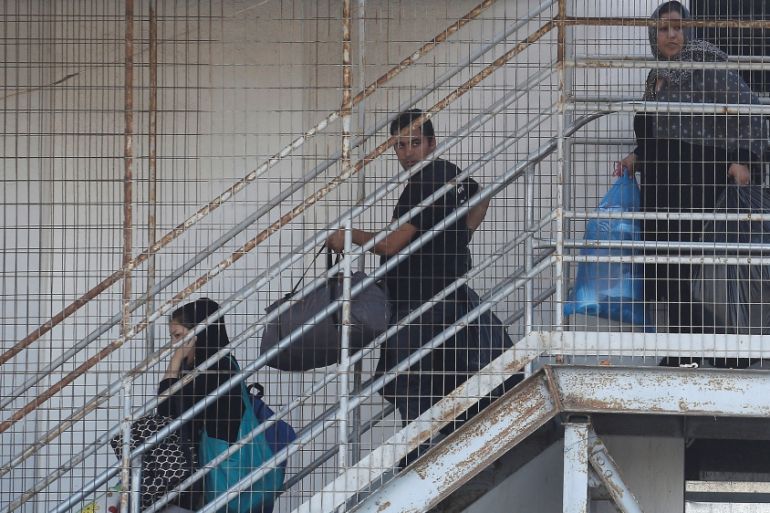Concerns as Greece clears out Elliniko refugee camp
Activists decry move to relocate hundreds of people outside Greek capital, as evacuation operation gets under way.

Greek riot police have begun evacuating hundreds of refugees from a makeshift shelter set up inside the abandoned buildings of Athens’ old airport.
A heavy police presence blocked off all access to the Elliniko airport site in the early hours of Friday, denying entry to journalists, as men, women and children collected their belongings and began boarding buses to camps elsewhere in Greece.
Keep reading
list of 4 itemsWill Israel’s war on Gaza sway South Africa’s election?
Masked Tunisian police arrest prominent lawyer for media comments
Gaza’s mass graves: Is the truth being uncovered?
Police had previously said up to 500 people, mainly families, would go to a camp outside the town of Thebes, about 70km northwest of Athens.
The remainder of mainly single people, estimated at more than 150, would be taken to Athens’ aliens department for identity verification, before being moved to facilities outside of the capital.
Elliniko #refugeesGR camp eviction started w/ GR riot police entering the premises to remove people. Journalists not allowed as per usual https://t.co/jfzwtUWUHt
— Marianna Karakoulaki (@Faloulah) June 2, 2017
Activists gathered outside the old airport to protest against the police operation, and decried the transfer of single people to the department on Petrou Ralli Street as “nothing else than a deportation procedure”.
“Police went in violently and occupied the spaces in order to move the refugees to areas they do not want,” Petros Konstantinou said, a left-wing Athens city councillor and coordinator for United Movement Against Racism and the Fascist Threat, told Al Jazeera from outside Elliniko.
“Police arrested the camp’s leaders, including Masoud Qahar, under the pretence of identity verification,” he added.
![Living conditions at Elliniko were criticised as deplorable and unfit for humans [Costas Baltas/Reuters]](/wp-content/uploads/2017/06/77f6c0ecb73946ea868175e588e989a9_18.jpeg)
Qahar, a former logistical officer with NATO who fled Afghanistan after he says he received death threats from the Taliban, has helped organise protests for better living conditions in Greece’s refugee camps.
A spokesman for Greek police told Al Jazeera that he could not comment on the issue as the operation was still under way.
READ MORE: From NATO to Antifa – One Afghan’s journey to Greece
Human rights groups criticised conditions at Elliniko, which had been home to around 2,000 mostly Afghans, as deplorable and unfit for humans. Hundreds slept crammed in tents in the old arrivals terminal last summer in scorching temperatures with little food.
Over the past 10 days, Elliniko’s residents were asked to willingly relocate to official camps, mostly outside Athens. Non-governmental organisations operating at the camp also left the site.
Greek officials reportedly said that 90 percent of refugees at Elliniko said they would relocate voluntarily, while the rest objected to being transferred.
![A girl holds up a teddy bear during a police operation to clear out Elliniko [Costas Baltas/Reuters]](/wp-content/uploads/2017/06/3ad6d50980ae43bf9c7594338e2d37d7_18.jpeg)
But Konstantinou said that about 150 people staying at the arrivals terminal were against their transfer outside the capital.
“We spoke to them on Thursday night, and all of them said they did not want to move outside Athens. They want to be relocated to apartments in the city and better access to food services,” he said.
Activists close to refugees told Al Jazeera that the refusal of many long-term residents of Elliniko stemmed from the uncertainty over the conditions they would face at the new camps. The move could also limit much-needed access to legal and psychological support, they said.
“This is a serious and complex issue, as most of these people are very vulnerable and in need of specific help – from lawyers and counselling to psychologists and medicines,” a Greek volunteer worker, who is in daily contact with refugees, said.
READ MORE: Syrian man dies in Greece after suffering extensive burns
Others, mostly Afghans not eligible for a European relocation programme to other member states, feared that moving farther from Athens would make it harder to leave Greece.
“The refugees have the right to live in humane conditions and not be transferred to another ‘ghetto’ camp like the one in Thebes or elsewhere,” Maria Bikaki, of the SYPROME solidarity group, told Al Jazeera.
“These are remote, isolated camps and completely unsuitable for vulnerable people and families – there is even a newborn child among those who are transferred,” she added.
According to SYPROME, the fenced camp outside Thebes is located next to a power plant and 12km from the nearest hospital, with only one coach service running throughout the day. Refugees there will live in containers – both during summer and winter – that can host up to eight people.
> If #refugeesgr deside to stay out of camps, they don't get the cash card. Also if they leave a camp, they cannot easily get back in.
— NoBorders (@Refugees_Gr) June 2, 2017
The refugees were first taken to Elliniko in November 2015 when police began transferring large numbers from the Greece-Macedonia border.
The government had long promised to empty the site, which it has agreed to lease to private investors under its bailout programme, but struggled to convince the refugees to move to other camps in the mainland.
More than 62,000 migrants and refugees heading to northern Europe have been stranded in Greece since countries in the Balkans shut their borders to those seeking passage in March last year.
Konstantinou, the Athens councillor, accused the Greek government and European authorities of “toughening their stance” against refugees and succumbing to pressure from an emerging “far-right sentiment across Europe”.
|
|